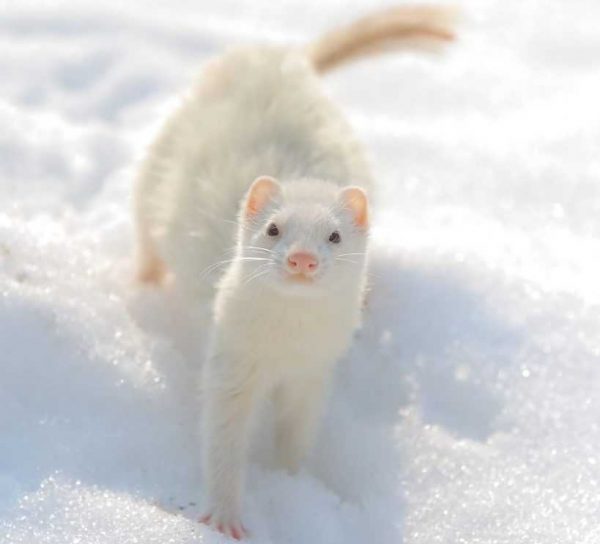In the wild, ferrets are known to take over tunnels that have been made by other creatures that they would prey on (such as prairie dogs) and turn them into their home. They live in grassy plains and also use burrows made by other animals. Ferrets can also withstand cold weather very well and some even love playing in the snow. They can handle cold weather much easier than hot climates. But you should keep in mind that the ferrets that are kept indoors have a much thinner coat than those that are kept outdoors.

1. Do ferrets like cold weather?
Some ferrets do better in cold weather than others, and it all depends on how thick their coat is. But generally, they prefer a chilly climate and not a hot environment. They can easily overheat and this can be a very serious issue for them. The coat of your ferret also depends on whether you keep the ferret indoors or outdoors.
This is also why they will shed a lot more if you keep them indoors, at higher temperatures as they don’t need the extra layer of coat. It’s best to keep your ferrets in the coolest room in your home.
2. Do ferrets like snow?
Some ferrets absolutely love snow while others hate it and would do anything to avoid it. You never know what your ferret prefers until you try to let it play in the snow. If it doesn’t like it, you will quickly notice its disapproving behavior and it would prefer to go back into your arms.
But if your ferret starts burrowing around and playing here and there, it means that it likes snow. They typically play until they get too cold to be able to stay outside anymore.
3. Can ferrets be outside in the winter?
Ferrets can handle living outside during winter just fine. But it all depends on whether you usually keep them indoors or outdoors. Don’t move outside a ferret that always stayed indoors as it doesn’t have the necessary coat to withstand the cold for long periods of time.
But if your ferrets are used to the outside world, you will often see them playing around in the snow. Some ferrets absolutely love the snow while others will spend most of their winter inside their burrows.
4. Do ferrets sleep more in the winter?
In the wild, ferrets can stay underground for more than a week during winter and they tend to sleep a little bit more. But you won’t really notice much of a difference as they typically sleep a lot. If they usually sleep around 16 hours a day, during winter they will sleep around 18 hours a day.
And if you’re keeping them indoors, you might not notice absolutely any change in their sleeping schedule. They’ll typically sleep when left alone and they prefer being awake when you are so you can feed and play with them.
5. How to keep ferrets warm in the winter
Make sure all the sleeping beds are made from fleece blankets and sleeping sacks. They love this material and it also does an excellent job at keeping the ferret warm during winter. If this is not enough, all you have to do is invest in an animal-safe heating pad and install it under their bedding. Heating pads should solve all the problems as they can be set to always maintain a specific temperature.
Make sure their water bottles are also wrapped up into something that prevents the water from freezing overnight. It’s highly recommended to change their water a few times a day and always replace it with warm water.
6. Do ferrets hibernate in winter?
Ferrets spend as little time as possible outside during harsh winters, which is why you might think that they hibernate. But the truth is that they only avoid spending time in the cold if they don’t actually have to hunt for food. The amount of time they spend outside decreases substantially but also the distances they typically travel.
They might end up sleeping an hour or two more than usual but these are not hibernating creatures. In fact, if you’re keeping them indoors, you won’t notice any difference in their behavior or sleeping schedule during winter.
7. Can ferrets live outside in winter?
Ferrets don’t experience extremely cold winters in their natural environment and their coats can’t withstand incredibly low temperatures. But if you have a good outside setup, you can keep your ferrets outside during winter. All they need is a place they can use to warm up when they need to.
And while they can actually thrive in mild winters, you should only let your ferrets live outside if you always kept them outside. Otherwise, their coats are much thinner and they’ll need to be kept inside. If you want to move them outside, do so gradually and under close supervision.
8. Do ferrets change color in the winter?

You might not notice any difference in your ferret during winters if you’re keeping it inside. This is because the ferret doesn’t need an extra layer of coat to keep warm. But if you’re keeping them outdoors, you will notice that ferrets change colors during winter. And this is all thanks to the thicker coat that they start growing to keep them warm.
If the ferret changes color but it’s not winter yet, then it’s something related to its diet and health and you should rush to the vet. Many ferrets with extremely poor diets develop a greyish coat.
9. Do ferrets get winter coats?
As mentioned before, there’s no difference in your ferret’s coat if you’re keeping it indoors. But if you have ferrets that are kept outdoors, you will notice that they have a short, silky coat during the summer and a thicker, longer coat in winter.
This thicker and lighter coat keeps them warm throughout the winter and then when spring comes, they will slowly start to shed it and get ready for summer.
10. Can ferrets wear clothes?
While you can dress up a ferret for some special occasions, you should be ready for them to slip right out of their clothes the moment you’re not looking. They are expert wrigglers and they’re too flexible to make them keep their clothes on for longer periods of time.
Spending money on ferret clothes is a complete waste as they would rather turn these clothes into toys than to actually have to wear them.

